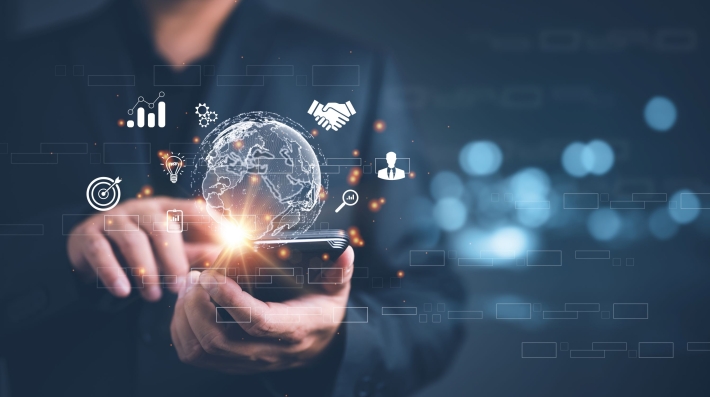Introduction: In our rapidly changing world, technology has a significant impact on the landscape of human security. From protecting individuals and communities to combating global threats, technology has had a significant impact on security. This article investigates technology’s multifaceted role in human security, its current applications, and its promising future.
Surveillance and Monitoring
One of the most prominent aspects of technology in human security is its contribution to surveillance and monitoring. Closed-circuit television (CCTV) cameras, satellite imagery, and drones have revolutionized the way we monitor public spaces, borders, and critical infrastructure. This technology helps in preventing crime, identifying threats, and responding swiftly to emergencies. In the future, advancements in artificial intelligence (AI) will enhance the predictive capabilities of surveillance systems, making them even more effective in ensuring public safety.
Cybersecurity
As our lives become increasingly digital, the importance of cybersecurity cannot be overstated. Technology has given rise to new threats in the form of cyberattacks, data breaches, and identity theft. To counter these threats, technology also provides the tools for robust cybersecurity measures. Firewalls, encryption, and threat detection systems are just a few examples of how technology safeguards our digital lives. In the future, the development of quantum-resistant encryption and AI-driven security systems will be crucial in maintaining human security in the digital realm.
Disaster Management
Natural disasters and humanitarian crises are unavoidable, but technology can significantly improve our ability to respond and recover. Advanced early warning systems, powered by data analytics and satellite technology, enable us to anticipate and prepare for disasters. Communication technologies such as social media and mobile apps facilitate real-time information sharing during emergencies. Furthermore, drones and robotics aid in search and rescue operations, reducing response times and saving lives. In the future, we can expect even more sophisticated disaster management systems that leverage AI, big data, and predictive analytics to minimize the impact of disasters.
Healthcare and Pandemic Response
Recent global events have underscored the importance of technology in healthcare and pandemic response. Telemedicine has become a lifeline, allowing patients to receive medical care remotely. Contact tracing apps and big data analysis have been instrumental in tracking the spread of infectious diseases. Vaccine development and distribution have benefited from advancements in biotechnology and logistics technology. Looking ahead, we can anticipate further integration of technology in healthcare, including personalized medicine, wearable health devices, and more efficient healthcare delivery systems.
Autonomous Systems
The rise of autonomous systems, including self-driving cars and drones, has the potential to revolutionize human security in various ways. Autonomous vehicles promise safer transportation by reducing the risk of human error. Drones can be used for tasks like border patrol, environmental monitoring, and emergency response without risking human lives. However, the integration of autonomous systems into society also raises ethical and security concerns, which must be addressed as these technologies advance.
International Security and Diplomacy
In the realm of international security and diplomacy, technology plays a pivotal role in intelligence gathering, communication, and conflict resolution. Cybersecurity and cyber espionage have become integral components of modern warfare. Diplomacy relies on secure communication channels and data encryption to protect sensitive information. The future of international security will likely involve complex negotiations regarding the use of emerging technologies like artificial intelligence, autonomous weapons, and space-based assets.
Conclusion
The role of technology in human security is dynamic and ever-expanding. It not only addresses current security challenges but also presents opportunities to enhance our ability to safeguard individuals, communities, and nations. While technology offers immense promise, it also comes with ethical, privacy, and security concerns that require careful consideration. As we continue to innovate, striking a balance between harnessing technology for security and safeguarding our values and rights will be a critical challenge for the future. Embracing responsible and ethical technological advancements will pave the way for a safer and more secure world for all.
What is the primary role of technology in enhancing human security?
Technology plays a multifaceted role in enhancing human security, encompassing aspects such as surveillance, cybersecurity, disaster management, healthcare, and international security. Its primary role is to provide tools and systems that protect individuals, communities, and nations from various threats.
How does technology contribute to cybersecurity and protect against cyber threats?
Technology contributes to cybersecurity by providing tools such as firewalls, encryption, and threat detection systems. These technologies safeguard digital assets and personal information, preventing unauthorized access and data breaches. Additionally, technology aids in identifying and mitigating cyber threats through advanced monitoring and response mechanisms.
What are some examples of technology-driven disaster management and response?
Technology-driven disaster management includes early warning systems that utilize data analytics and satellite technology, as well as communication tools like social media and mobile apps for real-time information sharing during emergencies. Drones and robotics are also employed for search and rescue operations. These technologies collectively improve disaster preparedness and response.
How is technology influencing healthcare and pandemic response?
Technology has revolutionized healthcare by enabling telemedicine, which allows remote medical consultations. Additionally, technology aids in tracking and managing pandemics through contact tracing apps, big data analysis, and vaccine development. It also supports healthcare delivery with innovations like wearable health devices and personalized medicine.
What are the security and ethical considerations surrounding autonomous systems like self-driving cars and drones?
Autonomous systems offer benefits like increased safety and efficiency, but they also raise security and ethical concerns. Security risks include potential hacking of autonomous vehicles, while ethical considerations revolve around issues like liability in case of accidents involving self-driving cars. Addressing these concerns is essential as autonomous technology advances.


